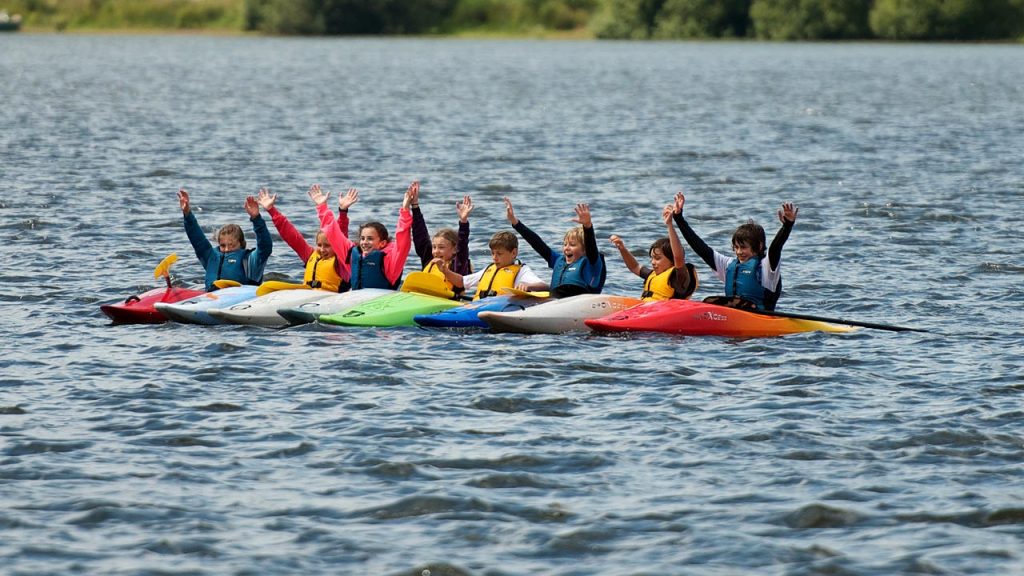Childhood is a magical time for learning and it is hugely beneficial for young people to explore outside in nature. We’ve long believed that getting outdoors is a crucial part of a child’s development.
Feeling confident in nature benefits children in their day-to-day life, as it builds their resilience in and out of school. Introducing young people to outdoor sports helps build better habits into adulthood.
It’s not just our gut feeling or experience that informs this opinion – there’s loads of science backing it up too!
Here are our top 10 reasons why getting outdoors benefits children:
1. It encourages kids to exercise
It seems like common sense, but now it’s been properly verified: kids tend to get more exercise when they play outside vs indoor games. This produces a swathe of benefits to their strength and development, both physical and mental.
2. It improves athletic abilities
Kids who play outside are faster on their feet. Compared to their indoors-y peers, they can run faster, jump further, and climb with more ease and dexterity.
3. It helps them become more confident in their abilities
During outdoor play – especially when it challenges any fears, such as heights or water – children learn that they can cope with frightening situations. When children master these challenges, they feel exhilarated, and some researchers believe that these experiences boost their courage and confidence.
4. Nature has positive psychological benefits
Nature experiences have a special, restorative effect. Playing in a green space results in improved attention and working memory performance.
5. It teaches new words and concepts
Hands-on exploration helps young children learn new words, especially words for things that kids can experience physically.
6. It reduces the chance that they’ll need specs
Whilst there’s nothing wrong with wearing glasses, they can be costly and inconvenient. Scores of studies show links between time spent indoors and the development of near-sightedness. Spending time in nature can’t guarantee that your kids will never need glasses (other factors may be hereditary), but it’s been shown to be protective by up to 14%.
7. It ensures that kids get enough sunlight
Lots of things go wrong when children don’t get enough sunlight. The brain tunes its inner clock using light cues, so going outdoors can help children maintain healthy sleep rhythms. Sunlight on the skin is also the best way to make vitamin D, which is crucial for their development.
8. Being outdoors can positively impact mental health
Kids who feel a strong connection with nature tend to be happier and better-adjusted. Observational studies suggest that lifelong exposure to green space has a positive impact on their emotional well-being and may reduce their risk of developing certain conditions, such hyperactivity and attention deficit disorder.
9. It teaches social skills
Researchers have found a substantial link between outdoor play and social savvy. Kids who engage in cooperative outdoor play are more socially expressive and able to engage in positive behaviours, like turn-taking and compromise.
10. It encourages them to respect and protect the environment
It’s generally understood that childhood experiences predict adult behaviour. Researchers have found that childhood time spent outdoors is positively linked with environmentally responsible behaviour during young adulthood.

It’s time to go on an adventure!
In summary, there are countless reasons to make sure that your kids spend time outside in nature.
At Hatt Adventures, we offer outdoor experiences to children and teenagers in many capacities. Whether you’re looking to book a day out with the family, host an outdoors-y birthday party for your mini adventurer, or organise a large event for your school, scout club, or youth group – if it’s an outdoor adventure, we can run it.
We’re obsessive about safety at the best of times, let alone when we’re working with young people. To run outdoor activities for under-18s in the UK, activity providers are required to fulfil strict safety management practices. These are licensed under the Adventure Activities Licensing Authority (AALA) – you can view our license on the AALA website.
